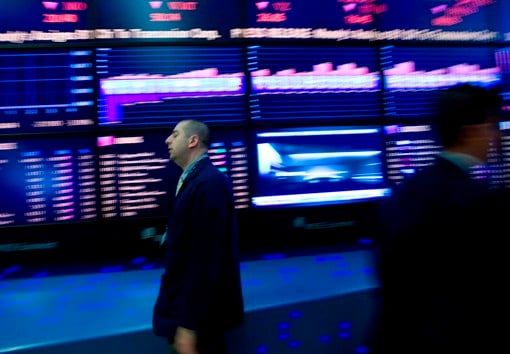Declining share volume and strategies by fund managers to hold down the cost of buying and selling stock may lower Wall Street trading commissions in 2010, defying forecasts for an increase, Greenwich Associates said.
Combined fees fell 13 percent to $12.1 billion in the first quarter, the Stamford, Connecticut-based research firm wrote in a report yesterday. The average commission for transactions including single equities and program trades slipped to 2.78 cents a share from 2.9 cents a year earlier, the report said.
“Brokers don't expect commissions to catch up with early rosy forecasts,” John Colon, a consultant with Greenwich, said in a telephone interview. “The first quarter was sufficiently anemic that you'd need to knock the cover off the ball the rest of the year. I think we're looking at a more flattish 2010.”
Wall Street firms are facing drags on their revenue as the European debt crisis spreads and Barack Obama's administration proposes limits on proprietary trading. David Viniar, the chief executive officer of Goldman Sachs Group Inc., told analysts at Sandler O'Neill & Partners that market participants are in a state of paralysis because of uncertainty over the economy and regulation, according to a note yesterday.
Average daily trading on U.S. stock exchanges was 9.52 billion shares so far in 2010, down from 11 billion a year earlier, according to data compiled by Bloomberg. Institutional investors projected a 15 percent increase in overall commissions this year, while hedge funds forecast a 20 percent rise, Greenwich said, citing its survey at the start of 2010.
Institutional customers who once relied on human traders at investment firms to broker their largest stock orders have increasingly turned to automated systems and private venues known as dark pools that don't display quotes publicly to buy and sell. The biggest investors did 44 percent of U.S. equity trading electronically in the first quarter, Greenwich said.
That's reducing costs. For institutions that paid more than $50 million in trading fees per year, the average commission rate fell to 2.45 cents per share from 2.67 cents. Hedge funds on average paid 2.47 cents, compared with 2.78 cents last year.
The rate for electronic executions without other services was 1.4 cents per share, down from 1.6 cents last year. The average rate for what are called agency executions handled by human trades was 3.8 cents per share. These trades don't require brokers to provide capital to facilitate customer transactions.
Morgan Stanley said equity sales and trading revenue fell 66 percent to $3.35 billion in 2009, or about 14 percent of its overall revenue in 2009, partly due to lower volume and market volatility. Equity commissions were $3.8 billion for Goldman Sachs in 2009, down 23 percent from a year earlier and about 8 percent of the firm's overall revenue, according to filings with the Securities and Exchange Commission.
The Greenwich report is based on interviews with 219 U.S. equity fund managers and 286 U.S. equity traders.
Most fund managers compensate brokerages for research and some advisory services by steering them trading business, a practice that could come under pressure as fees fall, according to Colon.
“The research and advisory component is stickier than the trading-driven jump ball business,” Colon said. About 53 percent of U.S. equity commissions were earmarked for stock analysis and related services in the first quarter, down from 56 percent in 2009, Greenwich's survey showed. “If there's a significant slump in commissions, the content takes up a larger share of what's left. That ultimately puts pressure on how the buyside allocates its commission dollars.
Credit Suisse Group AG and JPMorgan Chase & Co. handled the most U.S. trading in the first quarter, based on their share of commissions, Greenwich said in a report released today. Credit Suisse captured 8.9 percent of the total amount spent. Goldman Sachs Group Inc. and Bank of America Corp. were tied for fourth and Morgan Stanley was in fifth place.
Goldman's share of trades involving baskets of stocks topped the industry at 13.5 percent, followed by Credit Suisse, Morgan Stanley, Bank of America and Citigroup Inc. JPMorgan received the most in commissions for its equity research.
Greenwich ranks firms by a measure it calls trading quality based on scores in surveys covering trading ideas, service and other criteria. Barclays, Credit Suisse, JPMorgan and Morgan Stanley were ranked highest among the largest firms. Leaders for U.S. sales quality in small-cap and mid-cap stocks were Raymond James Financial Inc., Robert W. Baird & Co. and
Stifel Nicolaus & Co.







